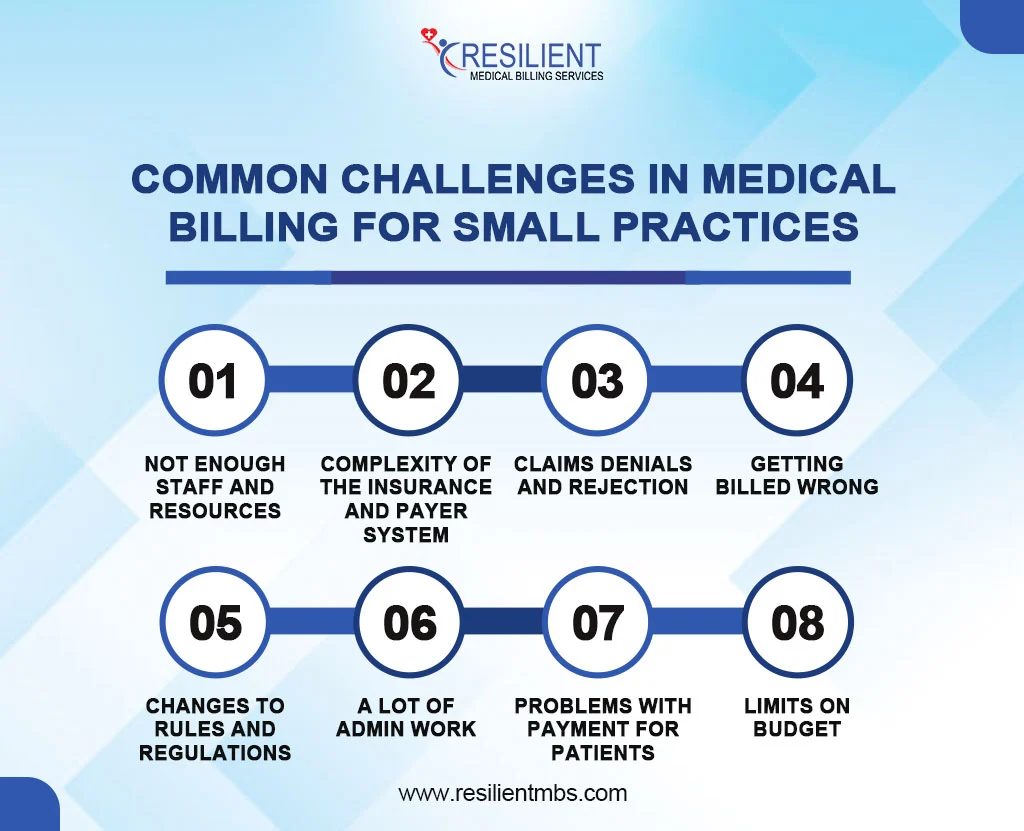Medical billing is the lifeblood of all the medical practices out there however it is of most essence that small independent practices get this right. Studies show the fact that 30% of all medical claims are either denied or delayed, which often casts significant small practices under considerable pressure in terms of cash flow.
For small practices that mostly use medical billing services for small practices, small and less staffed means that each mistake seems to slow progress down, and studies indicate that an average of $118 is spent on each claim that requires editing. This time and money small practices cannot afford to be losing.
It is like you have faced a situation where you could not understand insurance policies for your car and you think you might need professional help. Now imagine the frustration of trying to get through heaps of paperwork that never seems to end.
In this blog post, we’ll dive into the medical billing challenges small practices face and share practical strategies to improve medical billing errors, boost revenue, and get your operations running more smoothly. Ready to transform the way your practice handles billing? Let’s get started!
Table of Contents
The Evolving Dynamics of Medical Billing for Small Medical Practices
Medical billing for small practices is an integral part of most small independent practices’ revenue streams. This includes submitting claims to insurance companies, appealing for rejected claims, and getting our money back, on time. Again, small practices do not have advanced billing and coding services that large healthcare organizations enjoy making it difficult for them to decipher the various billing processes.
The greatest variation between small offices and larger healthcare organizations is in billing size and specialty. Scaled up healthcare organizations with properly staffed billing departments and with effective coding software and people, will be in a better position to address billing challenges and subsequent follow-ups. On the other hand, small practices only have one or two employees being tasked with these responsibilities within clinical practice.
Common Challenges in Medical Billing for Small Practices

Below are some of the most common challenges small practices encounter:
Not Enough Staff and Resources
People on lean teams or in small groups have to wear many hats. The people who take care of patients often have to bill, code, and check in with insurance companies. When there aren’t enough dedicated billing experts, mistakes, delays, and missed tasks happen more often, which hurts cash flow and reimbursement rates.
Complexity of the insurance and payer system
Medical billing for small practices is hard because of payer systems, insurance policies, and numbers. Small practices work with a lot of different insurance companies, each with its own rules, methods, and ways of applying. For practices that don’t have billing experts, it might be hard to keep up with these rules. Billing is hard because insurance plans and procedures are always changing.
Claims Denials and Rejection
Claims denials and rejections can be hard for small offices. A lot of time is spent by practices looking into, fixing, and resubmitting insurance claims that were rejected. Due to a lack of denials and appeals staff, small practices often have to wait for payments, which can make it hard for them to cover their costs and pay their workers.
Getting billed wrong
Billing problems often happen in small practices because of wrong codes, missing information, or patient data that hasn’t been checked. These mistakes can cause funds to be late, reimbursement rates to drop, or fines to be issued. When patient care and office work are done by small teams, it can be hard to make sure that bills are correct. Even small mistakes can cost a lot of money.
Changes to rules and regulations
Rules about healthcare are always changing. These rules include ICD-10, billing, and payment policies. Small offices need to keep an eye on these changes and make changes as needed to avoid problems with compliance. Changing the law can be hard for small businesses that don’t have a lot of time or money, leaving them open to fines or lost sales.
A Lot Of Admin Work
In small practices, staff members often have to do more than just care for patients. They also have to make sure that patients have insurance, collect copies, process claims, follow up on claims that are still open, and handle payment questions from patients. This backlog in paperwork can cut down on time spent caring for patients, which can make staff unhappy and lead to stress.
Problems with Payment for Patients
A lot of small businesses have trouble getting payments from patients. Patients do not pay their part of the bill on time or at all because of high deductibles, copayments, or confusion about their insurance benefits. Medical billing for Small practices might not have the means to keep track of and manage patient accounts, which could lead to unpaid bills and late payments.
Limits on budget
When small practices don’t have enough money, they use old payment systems or do things by hand. This waste can cause claim submissions to be late, lead to more mistakes, and miss opportunities to increase income.
Solutions to Overcome Challenges Of Medical Billing for Small Practices
- Outsourcing can reduce errors, streamline claim submissions, and improve revenue cycle management without the need for additional in-house staff.
- Use modern billing software to automate tasks such as claim submissions, patient invoicing, and follow-up reminders.
- Invest in regular training for staff to keep them updated on coding standards, payer policies, and billing regulations.
- Create a structured process to identify, investigate, and resolve denied claims quickly
- Assign dedicated time for claim follow-up, appeals, and resubmission to ensure timely reimbursement.
- Use automated insurance verification tools to ensure patient eligibility and benefits are confirmed before the appointment.
- Clearly communicate payment policies, including co-pays, deductibles, and payment deadlines, to patients upfront.
- Set up automated reminders for outstanding balances and follow up with patients on unpaid invoices to ensure quicker payments.
- Conduct regular audits of your coding and billing practices to ensure compliance with current regulations and accuracy in billing.
- Stay informed about updates in insurance regulations, billing codes (such as ICD-10), and reimbursement policies by subscribing to relevant industry news or joining professional associations.
- While fully automated systems can be expensive, consider using a hybrid approach that integrates both manual and automated billing processes to balance efficiency with cost-effectiveness.
- Use Electronic health records (EHR) and integrated billing software that work seamlessly together to streamline workflows.
- If outsourcing isn’t an option, consider hiring a dedicated billing specialist or consultant who can focus solely on the billing process.
Challenges of Traditional Billing for Small Practices
Traditional billing techniques though easily recognizable cause problems to small scaled practices. Most of the tasks can be time-consuming, prone to errors and unable to manage the complicated insurance claims and as a result more and more claims are being rejected and payments kept delayed. Small staff participating in care delivery realize they spend most of their time doing clerical work which takes focus from the patients.
How to Solve These Traditional Challenges
These issues can be solved by adopting the electronic billing systems which make the working processes quicker, fewer errors and faster submission of the claims. Interestingly, many practices see a 20-30 percent revenue a year after implementation of automated solutions that allow them to focus more on patients.
Final Words!
Every day, small practices come across various hassles and this factor still applies when it comes to medical billing for small practices. These include errors in billing, failed payments in small medical practices, and problems associated with cases where clients wish to change their billing methods. But these are barriers that can be crossed anyway.
Adopting effective medical billing, outsourcing medical billing, staff education and having well defined payment processes can assist the small practice in enhancing its medical billing problems.
If your small practice has medical billing issues, it’s time to evaluate your systems and potentially make changes. Resilient MBS can help to reduce errors in medical billing for small practices and improve your practice’s revenue cycle. Contact us today. If you’re a small practice in need of better billing for your medical practice, we have free audits and consultation on billing!










